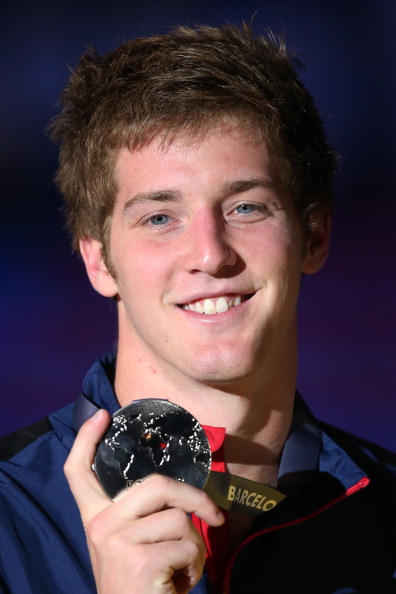BARCELONA -- The world knows Michael Phelps. It knows Ryan Lochte, who won his third straight men's world championships 200-meter individual medley here title here Thursday night at the Palau Sant Jordi. It knows teen sensations Missy Franklin and Katie Ledecky. They each won more gold medals Thursday, too, swimming legs of the 4x200 freestyle relay.
No, Phelps isn't swimming here. Even so, this deep U.S. team is still -- with five days down, three days to go -- dominating the medals count at yet another world championships, and the story of how Jimmy Feigen won silver Thursday in the men's 100 free offers revealing insight into the American way.
The U.S. swim team has 18 medals in the pool, 20 overall. Swimming is by definition an individual sport. But at big meets, it is also -- and the Americans understand this better than anyone in the world -- a team event.
It sounds simple. But it's not.
It's not just that the Americans have considerable talent. Of course they do. But it runs far deeper than that.
It's about creating, and sustaining, a team culture that promotes and inspires best performance.
As Cate Campbell, the outstanding Australian swimmer put it in a news conference here before the meet got underway, "When you go away, the swim team becomes your family. Healthy family -- healthy swimming. I think that has been really important."
Consider the way the Americans talked about each other after Thursday's racing:
Ledecky swam her first-ever leg on a U.S. relay, leading off that 4x200 swim. When she touched, the Americans were in first. She said the experience was "awesome," adding, "It meant a lot to get up and race with three girls behind me," calling it "definitely the most fun I have ever had in a race."
Karlee Bispo, who swam third, after Shannon Vreeland, earned her leg -- her first-ever start in an international final -- after a solid preliminary swim.
Bispo said, "To be with three Olympians, and amazing people, and to be able to represent my country, and look back and hear the 'U-S-A' chant and wear our flag on our suit and cap -- to win the gold medal is something I will never forget. I was trying to hide back the tears hearing the national anthem."
Franklin, winner of the 200 free Wednesday, swam another outstanding 200 -- 1:54.27 -- to ensure the victory.
She said, "Being a part of a team is the most important part of swimming for me, which is different, because a lot of people think of it as an individual sport. But when you get out there and you have three people who are not only your teammates but your friends -- that you know are going to support you no matter what -- you just have this whole new energy about you.
"And you want to go out there and race harder than you have ever raced before."
Lochte:
"I think one of the reasons why Team USA is so dominant is because we're what I feel like is -- we're like the one team that comes together. It's not separate. It's not a men's team. It's not a women's team. We help each other out. The guys help the girls out. The girls help the guys out. I think that's why we're so dominant -- we push each other. That's what makes a team."
In a different team culture, it might have been easy for Feigen's performance Sunday night in the men's 4x100 relay to make for a longstanding disaster.
Instead, it now looks like the kind of thing that obviously not just kickstarted him here but might well galvanize him to and through both the world championships in Kazan, Russia, in 2015 and the Rio Summer Games in 2016.
Which, by the way, is just the way the U.S. coaches planned it all along.
It's called trust and faith in him, and each other. That's what families do.
The relay rewind: handed the lead, Feigen went a too-slow 48.23. The French won.
What happened next?
A little back story:
Feigen went to college at Texas, where he won the 50- and 100-yard free at the 2012 NCAAs under the direction of coaches Eddie Reese and Kris Kubik. At the Summer University Games in China in 2011, he won the 100-meter free. Last year in London, he swam in the prelims of the 4x100 free relay that would ultimately win a silver medal.
Feigen qualified for these 2013 worlds by finishing second at the U.S. nationals in the 100 free. In him, the U.S. coaches, led by men's head coach Bob Bowman, see enormous upside.
That's why they dropped him into the anchor slot Sunday night in the 4x100 relay. It was his first major-league performance.
He would say late Thursday, "I'm still kind of a rookie to the whole world-circuit thing. I got a little bit of rookie nerves when it came to that relay. I kind of felt like I let everybody down. So I felt like it was my duty at this point to step up and show I do belong, I do belong with these swimmers."
Feigen is now 23.
After the relay, one of the people he sought out is Jack Roach, the U.S. junior national team coach, who is here with the American staff. Feigen and Roach have a history. It goes back to when Feigen was 9, at the University of Texas swim camps, and Roach was a coach there.
For that matter, virtually every swimmer who has come up in the American program has a connection not just to -- but with -- Roach. Here's one of the main reasons why: "I never," he said of his current role, "consider myself more than a consultant."
In this context, that means this: Roach is keenly aware that when this meet ends, Feigen is heading back home. Yes, there's a mission now. But Feigen has relationships with his coaches back home, too. What do families do? They look after each other, even across the oceans.
Feigen initially brought up this concern to Roach: if I swim faster in the 100, will people think I didn't try in the relay?
"We got off that relatively quick," Roach said, adding it was important to recognize that of course American swimmers "do feel a relay position is an honor and they never want to drop the ball in that situation."
Then the talking got down to real strategy -- how to best prepare for the 100 itself. "The second thing we discussed," Roach said, "was how would Eddie and Kris help you strategize the race."
Roach added, "When I'm dealing with someone else's athlete, I think it's very important that I let them know that they know themselves better than I know them. I like to provide them with questions they can ask themselves."
There was some technical talk. But, really, as Roach said, at this level, the preparation is "all mental."
"Everyone," Roach said, "strives to be a champion. When you're a champion, you're worthy. Sometimes you're worthy and you aren't a champion. What do you learn from every experience to become a little more worthy so you can move into that championship state? So much of it is accountability to the athletes who are in front of you."
Feigen's best 100 time before this meet in Barcelona: 48.24.
In Wednesday's semifinals, he went 48.07.
Then, in Thursday's final, 47.82.
Australia's James Magnussen -- out-touched by American Nathan Adrian by one-hundredth of a second last summer for the gold medal in London -- won the race, in 47.71.
Adrian took third, in 47.84.
The last time the U.S. men had won a world championships medal of any color in the 100 free? 2001, Anthony Ervin, gold.
For Magnussen -- who became the third Australian to win an individual discipline twice at the worlds, after Ian Thorpe and Grant Hackett -- the win was about team and family as well: "We felt a little isolated last year. I felt like I had everyone's support this year. I felt like I was representing a team I was proud to represent this year, and that made my job a little easier."
For Feigen, too: "I started out a little shaky with this whole world championships thing but I think it's coming together in the end."
Finally, here's the reason Jack Roach is on staff in Barcelona, and is so integral to the American swim team's winning culture:
"I don't really feel like I can take much credit here," he said, and he's not being self-deprecatingly humble. He means it. "It's about the athletes Jimmy is surrounded with and the coaching staff back home and the support he gets."
As Ryan Lochte says -- jeah.





